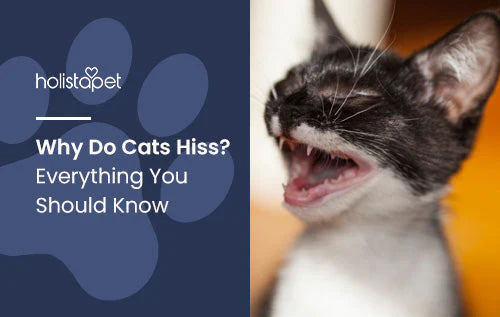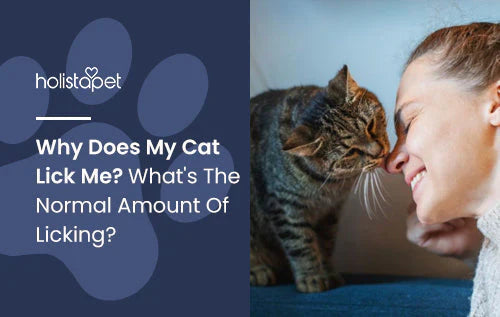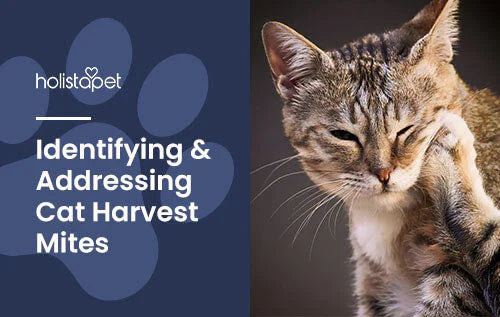Wide eyes with giant pupils. Fangs bared. Fur prickling. Claws out. Seeing a cat hiss can be quite alarming. It can often seem aggressive or like your cat doesn't like you at all — not true at all. So why cats hiss? Hissing is often a response to fear or stress. It's a way for felines to warn others to back off. Hissing is defensive, meaning your cat is doing it in response to something they don't like. We're here to tell you what exactly makes a kitty start hissing and how you can stop them from hissing at you.
Is It Normal for Cats to Hiss?
Cats hiss by exhaling air through the mouth. A hissing cat will often have flattened ears, bared teeth, and sometimes an arched back or puffed up fur. It can honestly be a bit concerning, maybe even scary. While you don't want to hear hissing, it's a perfectly normal behavioral response for cats. This is a reaction that many cats naturally have in response to certain situations, people, or feelings. According to Animal Planet, some experts even believe cats developed the habit of hissing by imitating snakes and many are curious about why do pumas hiss all the time and puma hissing meaning.
Why do pumas hiss? Mimicking other species is often a survival tactic for some animals, including big cats. Do pumas hiss when happy? While it sounds different than a domesticated cat, pumas, and cheetahs also hiss! This is a behavior that cats had before they were domesticated, meaning it's most definitely a normal behavior for felines.
What is Normal vs. Abnormal Hissing?
Even though hissing is perfectly normal for cats to do, sometimes hissing can still be a concern for owners. What are the cat hissing reference? Every cat is different, meaning the way they behave will vary. You should be concerned about your cat's hissing if that isn't a normal reaction for them to have. If your cat is often friendly and open to human interaction, it can definitely be a cause for concern when they hiss in response to you trying to pet them. This could be a red flag that something your cat is thinking or feeling needs to be addressed.
Why Do Cats Hiss?
Feeling Threatened
While many people believe that hissing is done out of aggression or hatred, cats most often hiss to express fear. It's a common response to feeling threatened. Felines will hiss as a warning, making humans and other animals aware that they should stay away from them. Cats are not usually an aggressive species. They will often avoid confrontation, choosing to hide in a box or run away instead of approaching a threat. But if they feel backed into a corner or unable to avoid the aggressor, cats will often hiss and swat to keep them from coming closer.
Being Protective
Mother cat will often start hissing to warn humans and other animals to stay away from their kittens. Even aother cat that usually doesn't hiss will sometimes become quite vocal when they want you to back off from their litter.
Feeling Annoyed
Some felines will hiss just because they are plain old annoyed. Since they can't speak human, cats will use meows and hisses to vocalize their emotions or desires to us. If you can't read their body language correctly, a cat may give off a quick hiss and swat to further emphasize that they don't like what you are doing.
Feeling Afraid
Cats are creatures that love routine. If you move your cat to a new home, introduce a new pet, or invite a new friend over, your cat can become disoriented and anxious. Some people even notice their cat's hissing at new toys. This can be your cat expressing discomfort and fear.

Feeling Stressed
A cat may also use hissing to respond to stressors in their life. For example, if your cat hears fireworks going off that will trigger their need to flee. While hiding, your cat may be more apt to hiss since they are feeling stressed at their environment. This may also be their response to vacuums, kids running at them, and other loud or quick environmental changes.
Experiencing Pain
Physical pain is a common reason that a feline will start hissing. When a cat is feeling unwell or is injured, they will feel more vulnerable and stressed. In response, your cat may hiss when you approach them or attempt to pet them. They may hiss when other animals approach where they are hiding or attempting to be comfortable.
Related: What Can I Give My Cat For Pain Relief?
How Do I Stop My Cat From Hissing?
If you suspect that your feline is hissing in response to one of the above emotions, you need to pinpoint exactly what behaviors, actions, or moments are triggering their hissing. Start really studying the exact moments that make your cat hiss and then hone in on their behaviors before the hiss.
Since felines aren't as expressive as dogs and humans, we can sometimes miss their cues. For example, an annoyed or threatened cat will flatten their ears. Their pupils will get larger. You may start noticing their body getting tense and their tail flicking. When you start seeing these signs immediately stop what you were doing, even if you feel it was something innocent like a pet.
Take note of where your kitty is. Are they hiding in a laundry basket or drawer? It's possible they are trying to be alone or are trying to de-stress away from the rest of the house. If you keep trying to interact with them while they are in this safe spot, they may feel cornered and defensive.
Make sure to give your kitty space when they appear stressed. If you notice their fur standing on end or their ears flattening, back away. Don't antagonize them by laughing or trying to pet them. Don't point at them. Give your cat alone time so they can calm down. When they choose to be around you again, provide them with treats, pets, and other things they like. Try playing with them, using interactive toys.
Hissing felines that seem unnerved or unable to calm down may need some extra help. Try adding some drops of CBD oil for cats on their food or giving them CBD cat treats. CBD is a non-psychoactive phytocannabinoid found in hemp. It reacts with the cannabinoid receptors found in your cat's endocannabinoid system (ECS).
Your cat's ECS helps balance their mood even when there are outside factors like new environments and loud kids. CBD can give them a calming feeling, leaving them less likely to feel scared or tense. This will promote less hissing if CBD is combined with proper space and treatment.

Should I Go To The Vet For a Hissing Cat?
If you suspect that your cat is hissing in response to pain, you should immediately take them to a trusted veterinarian to find the source of their discomfort. Cats are usually experts at hiding pain so you will have to pay extra close attention to their behaviors — including hissing.
If you notice them hissing when you pet them in certain areas, there's a high possibility they are experiencing pain of some sort in that spot. If your cat becomes upset and hisses after jumping off the counter or other activities, that may also be an indicator that they are in pain. Find out more about cat care here.
Final Thoughts - Why Do Cats Hiss?
Cats hiss when they are stressed, afraid, threatened, or in pain. It's a defensive cat behavior that often means you're doing something your cat doesn't like. It's important to notice the warning signs before they start hissing to better pinpoint why your cat is resorting to that behavior. That way you can make sure your cat is comfortable, happy, and secure. Learn more about our brand and website.


 CBD Oil for Cats - Fast Acting
CBD Oil for Cats - Fast Acting
 CBD Cat Treats - Easy Dose
CBD Cat Treats - Easy Dose
 CBD Calming Chews for Cats - Highly Rated
CBD Calming Chews for Cats - Highly Rated
 CBG Oil for Dogs and Cats - Loved by Thousands
CBG Oil for Dogs and Cats - Loved by Thousands





Leave a comment
All comments are moderated before being published.
This site is protected by hCaptcha and the hCaptcha Privacy Policy and Terms of Service apply.